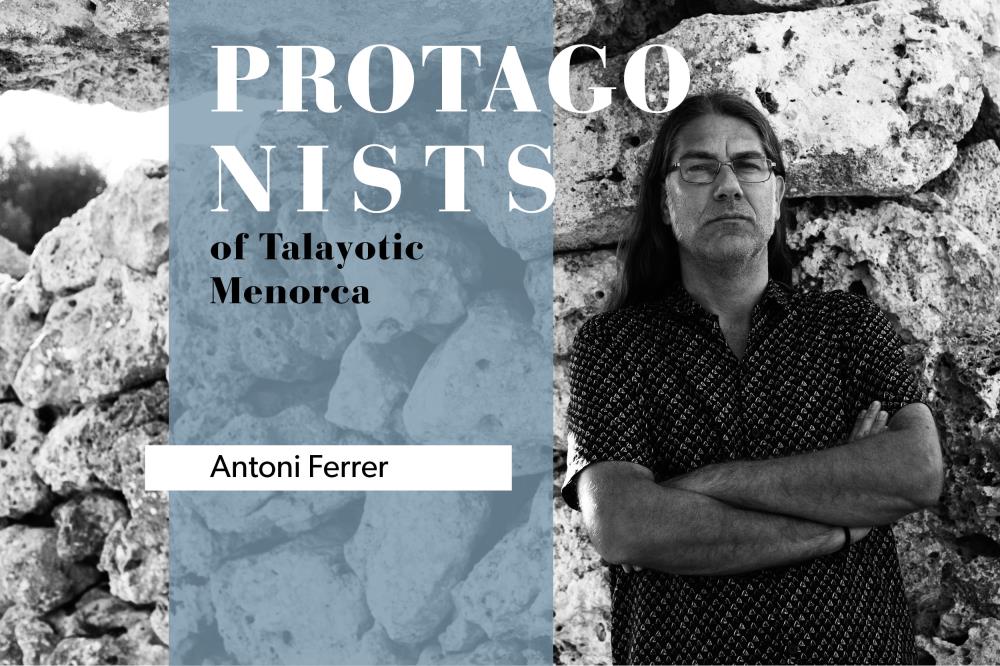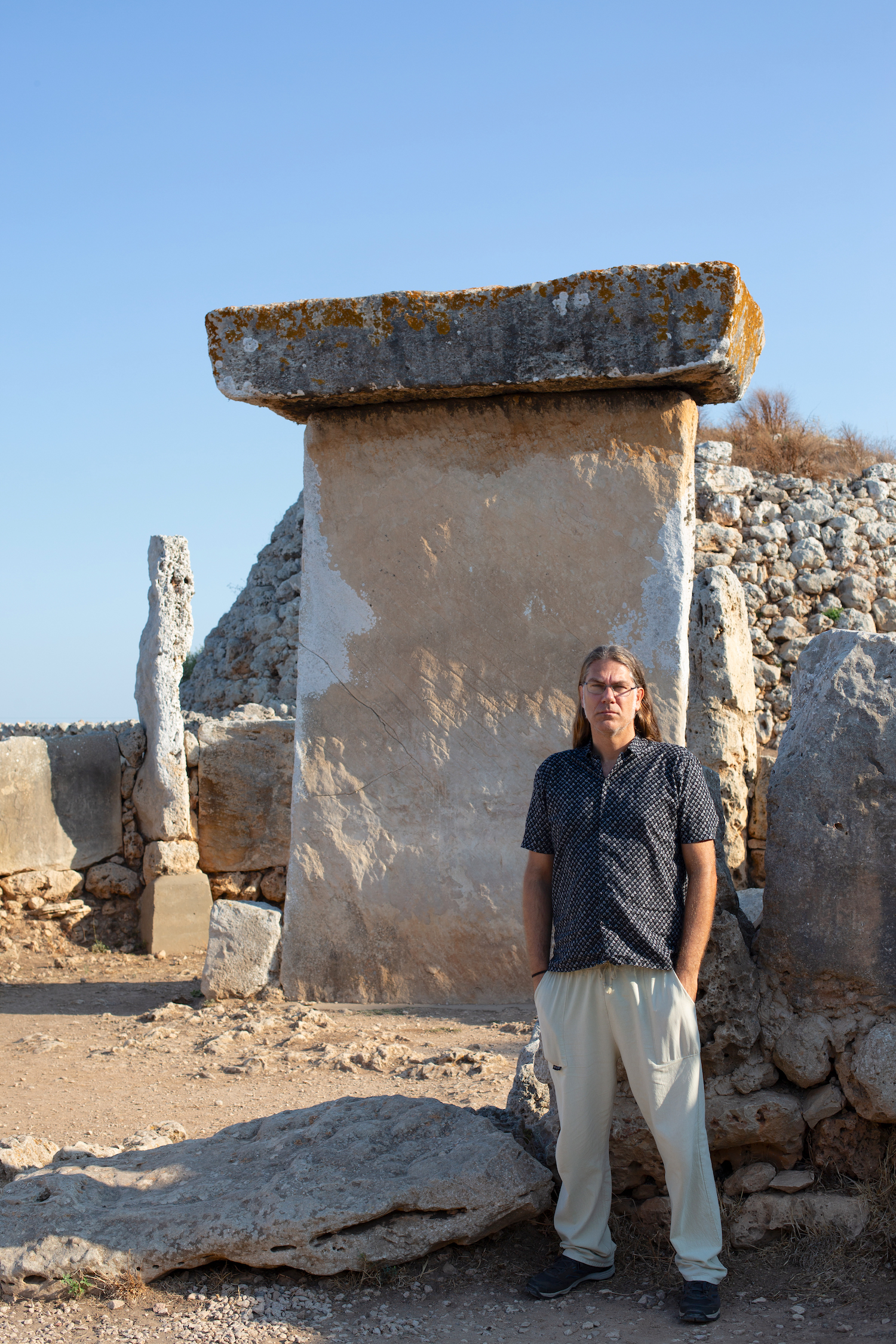 Antoni Ferrer Rotger is an archaeologist, specialising in the prehistory and protohistory of the Balearic Islands. With a long career in the field of research, he has co-directed research projects at the sites of Cornia Nou, Cala Morell and Torre d'en Galmés (Menorca), and at Sa Ferradura (Mallorca).
Antoni Ferrer Rotger is an archaeologist, specialising in the prehistory and protohistory of the Balearic Islands. With a long career in the field of research, he has co-directed research projects at the sites of Cornia Nou, Cala Morell and Torre d'en Galmés (Menorca), and at Sa Ferradura (Mallorca).
He is currently the director of the Talayotic Menorca Agency, the body responsible for the management of Talayotic Menorca and the conservation of its outstanding universal value.
You have been linked to the candidacy for a long time, as you have been one of those responsible for its reformulation since 2017. How are you facing this new phase as the head of the TM Agency?
Actually, my involvement with the candidacy goes back even further. In 2013, as a freelance archaeologist, I did some work related to the preparation of the dossier and gave some informative talks on the candidature. On the other hand, I have been working professionally on Menorca's prehistory for about twenty years: excavating, publishing, carrying out educational activities, setting up exhibitions, giving talks... Therefore, in my new position I am working in an area I know well, although from a new perspective, to a certain extent.
As we were saying, a new path is also opening up for Talayotic Menorca with the leading role of the TM Agency. What objectives have you set for the agency in these first years of its existence?
In general, my aim is for the agency to reach five years of life having incorporated the staff necessary for it to function properly. On the other hand, during these years we must create and consolidate the technical work structure of the agency and establish permanent collaboration links with other institutions, such as the Biosphere Reserve Agency, the Institut Menorquí d'Estudis (IME) or other research centres that develop projects linked to the prehistory of Menorca.
I believe that one of the long-term objectives must be to make Menorca a benchmark in terms of archaeological heritage management. In this sense, it is very important to give greater stability to existing research projects, as well as to support new projects in which research centres outside the island are involved, capable of providing their own resources. I also believe that we must continue working to ensure that Menorca's prehistoric heritage occupies a prominent place among the island's most important assets, both for residents and visitors.
Finally, these first years must also help the Menorcan population to appreciate the work of the TM Agency, as it will be this institution the one responsible for guaranteeing the conservation of our prehistoric heritage for future generations.
In terms of lines of work, in what direction will efforts be focused?
To fill the position of director of the TM Agency, a selection process was carried out in which each candidate was asked to draw up a project for the next five years. In this document, which will soon be available on this website, I set out a large number of lines of work. It is impossible to summarise them all, but I would like to highlight three.
 One of the most important aspects is the collection of data that will allow us to plan actions with full knowledge of the facts. At the moment we do not have precise data on the number of visitors to the archaeological sites each year, as these are only counted during the summer at a few sites. Nor do we know how satisfied visitors are, what aspects they would like to know more about, etc. Knowing this data is essential for the correct planning of conservation, adaptation and dissemination actions. Therefore, it will be necessary to implement a whole system for the collection and statistical processing of data, in collaboration with the OBSAM (Socio-environmental Observatory of Menorca).
One of the most important aspects is the collection of data that will allow us to plan actions with full knowledge of the facts. At the moment we do not have precise data on the number of visitors to the archaeological sites each year, as these are only counted during the summer at a few sites. Nor do we know how satisfied visitors are, what aspects they would like to know more about, etc. Knowing this data is essential for the correct planning of conservation, adaptation and dissemination actions. Therefore, it will be necessary to implement a whole system for the collection and statistical processing of data, in collaboration with the OBSAM (Socio-environmental Observatory of Menorca).
Another aspect to be highlighted is that of scientific research. In recent years, more and more academic institutions outside the island have been participating in research projects led by local teams, or local archaeologists have been involved in projects promoted by foreign centres. This network is very positive, and should be encouraged and consolidated through collaboration agreements between the TM Agency and the research centres.
On the other hand, it should be borne in mind that many of the sites that make up Talayotic Menorca are privately owned. The owners must become actively involved in conservation, and the Custody Contracts programme developed by the Consell de Menorca aims to encourage this involvement, with the support of the public administration.
Everything seems to indicate that in September Talayotic Menorca may be named World Heritage during the next UNESCO World Heritage Committee in Riyadh. What should this distinction mean for Menorca?
The inscription on the UNESCO World Heritage List should be a stimulus for Menorcans in the conservation, research and dissemination of archaeological heritage. Obviously, an important part of the work corresponds to the managers, researchers and restorers, but the preservation of this heritage that we have received from our ancestors is everyone's responsibility. From a more pragmatic perspective, being on the World Heritage List can serve to make it easier to obtain economic resources from outside the island to invest in historical heritage. This will undoubtedly be positive, due to its capacity to generate jobs and new knowledge.
And how do you see the future of Talayotic Menorca, what are the main challenges to be faced?
There is one fact that I think makes it clear to what extent Menorcan society has assumed the Talayotic Menorca candidacy as its own: the project has been maintained throughout five terms of office of the Consell, with different political parties, since 2009 when the IME proposed this initiative. Possibly in the future we will have to maintain this persistence and unity to face challenges that we cannot foresee today. Since we started the candidacy process, we have experienced a financial crisis, several humanitarian crises and a health crisis. Now experts are warning us that we are at risk of a climate crisis and an energy crisis.
In this context, perhaps the greatest challenge for Talayotic Menorca, and for historical heritage managers in general, is to vindicate the value of a sector that allows us to generate economic growth without generating waste or pollutants, and without high consumption of energy or raw materials; that does not allow speculation or the relocation of businesses; that creates stable, quality employment and, finally, that fosters knowledge and reflection on our past and our future. There are few areas of human activity that bring together so many positive aspects and are so closely linked to the fight against the problems that currently threaten us.